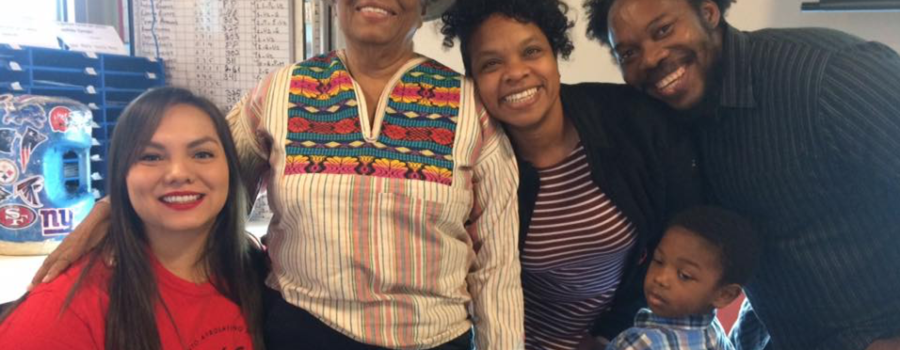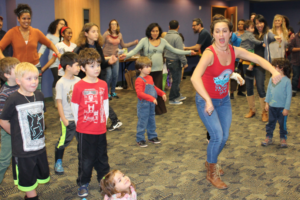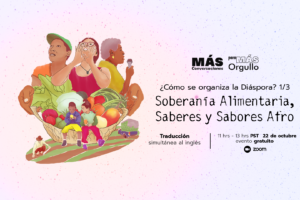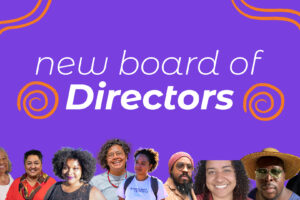By Sarah Sigie
I started collaborating with MAS almost two years ago, and today that my cycle comes to a temporary end (I have moved to another city) I wanted to reflect on what these 20 months of having MÁS in my life mean for me.
MÁS stands for Movimiento Afrolatino Seattle, and their movement inspires social change and racial equity by raising awareness of the contributions of Latinos of African descent. Being part of MÁS means letting your body, mind and soul move to become a better member of the community and a better human being.
MÁS has transformed my life in a very positive way, as it has taught me about the African diaspora and how present the reality of our Afro-Latino communities is among us, about the healing capacity of art, its power to unite communities, and about how unity can make a difference. All these learnings have created an inner thirst for self-reflection and gratitude.
Collaborating with MÁS represented a process of internal growth. From discovering and understanding my role in the organization to the intense need to know my history and culture, and learn about the African diaspora and systems of oppression.
If I’m asked what I am to get a quick visual of who I am, I’ll most likely have to answer the options available on each government form or job application. I would have to identify myself as Latina, Mexican to be precise. This label initiates a division and classification that involves assumptions about the color of my skin, my cultural background, my legal status, and the way the world perceives me. Being part of MÁS included the recognition of the privileges and limitations that the color of my skin plays in defining my daily experiences. I am mestizo, and therefore I cannot recognize myself as Afro-Latina. This in no way translates into a feeling of otherness within the organization because MÁS became my family. However, there were times when I hesitated about my role and whether or not I should express my opinion on issues like race and oppression, mainly because I consider myself privileged in many areas of my life.
This awakening prompted a series of self-reflections in conjunction with each of the experiences shared with MÁS, and I began to think about Mexico. I began to clearly visualize the system of oppression and how my culture structures it. From the idea of “master” and “servant,” and the power play between these two roles, to the way we culturally label beauty as whiteness, to the way our rich vocabulary also serves as a vehicle to denigrate the that it looks different using the comic resource, to the oppression that Afro-Mexicans and indigenous peoples experience in my country. It was crucial to understand that these forms of language and this reality do not come from a place of hate, they have been institutionalized and internalized by us. It’s hard to see the big picture when division, fear, and constant competition for a living take up most of our time and thoughts. However, it is possible.
During this internal process, I went through a period of learning and accepting my indigenous and Spanish roots, which led me to recognize the presence of African roots in me and how every time the drum sounds my heart begins to beat rapidly and I can’t stop the desire to move.
This deep learning, and at times painful (healing hurts), made me a better person. I am consciously working on using my words wisely and meaningfully, whether in English or Spanish, and every day I work hard not to let the labels that others use to define me dictate what I think and feel about myself.
One of the main lessons I learned from MÁS was achieving a balance between loving my roots, being proud of my language and where I come from, while developing the ability to admire, learn and recognize myself in other communities and other cultures. It sparked a desire to understand why other people are who they are and where they are in life, to feel how they feel, and to have that curiosity to learn about them and appreciate their contributions to our communities, our countries, and our world.
This appreciation feeds on not positioning one culture as better than the others, and implies the ability to value each culture and understand the equitable role they play in our world. It is to share your roots, your language, your experiences, your beautiful skin and hair, to contribute, surprise and amaze you how many things we can achieve together. We just need to listen and open our hearts to see the beauty in each of us through the eyes of gratitude and their ability to heal by improving our world.
I feel deep gratitude and affection for each of the people I have met through this organization. I feel empowered to be myself, to be grateful for my roots and to recognize in each part of myself the reflection of the other. It has been a pleasure and an honor to be part of this incredible group of people. My heart is full of love, gratitude and hope. MORE keeps moving me every day. Let MÁS move you, and be part of MÁS generating more movement and contributing to a better world.
















